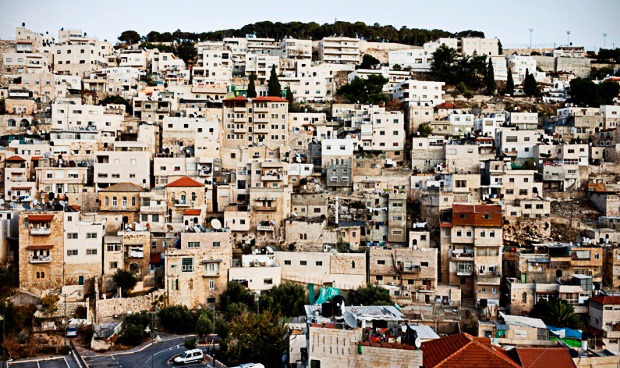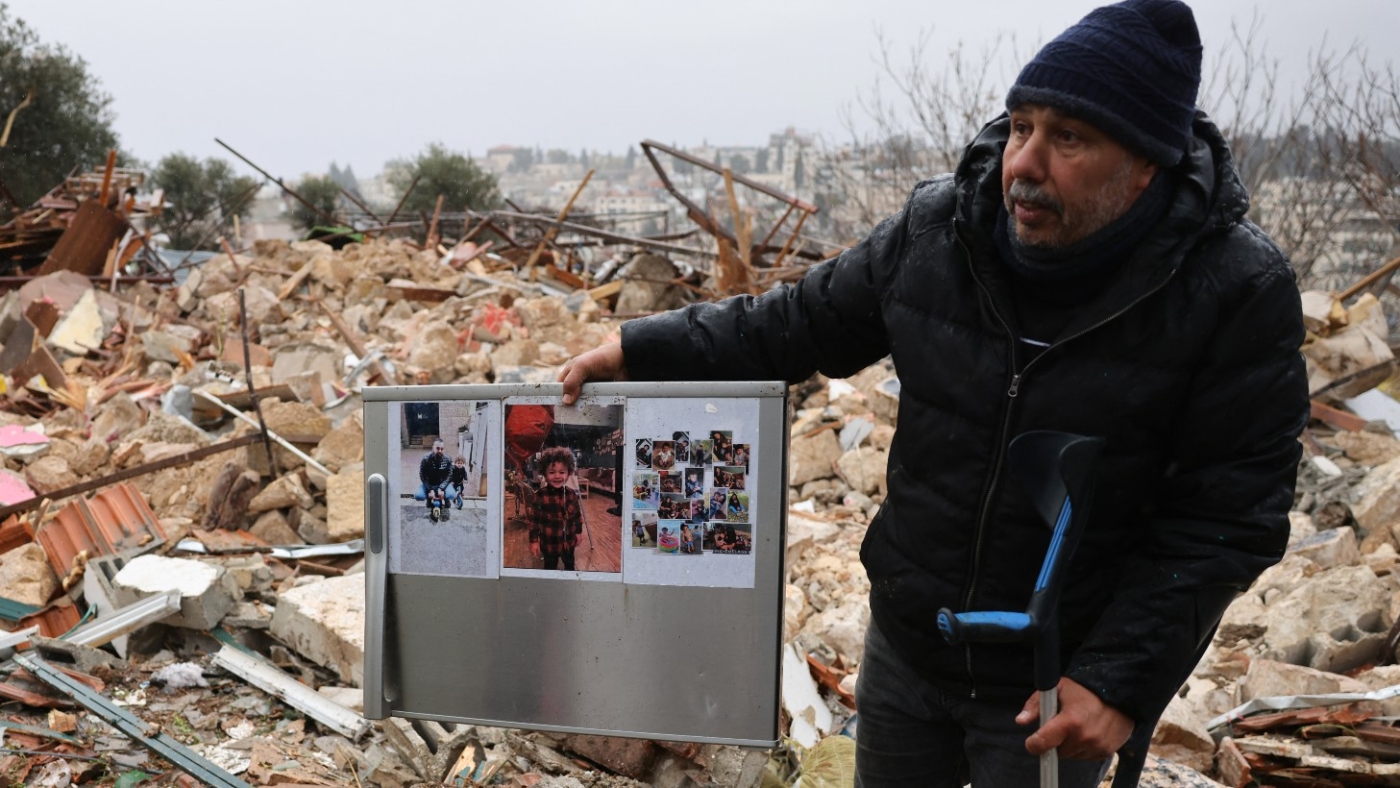Draconian law applies only to Palestinians and has remained a stable policy for Israel for more than half a century, legal experts tell MEE
With more than a dozen pages and 39 articles, the Absentees’ Property Law is one of Israel’s founding texts, granting the state the power to confiscate and impound Palestinian properties and assets that they were forced to leave behind in 1948.
The law, which applies only to Palestinians, is draconian and has remained a stable policy for numerous Israeli governments over the years, legal experts told Middle East Eye.
This week, Israel has used the law to justify the eviction of the Salhiya family and the demolition of their house in occupied East Jerusalem’s Sheikh Jarrah neighbourhood.
The Absentees’ Property Law puts Palestinians at a disadvantage from the start, branding them absentees even if they are present in the country or hold Israeli citizenship.
The law was issued in March 1950 by the government of Israel’s first prime minister, David Ben-Gurion.
Israeli leaders had to deal with vast swathes of lands and thousands of properties in more than 500 towns, where their Palestinian population was emptied by Zionist militias during the Nakba (Catastrophe) of 1948 and the establishment of Israel.
They also had to handle the assets – including cash, stocks, furniture, books, companies, banks, and other movable assets – left behind by almost 800,000 Palestinians who fled and ended up in refugee camps in Jordan, Syria, Lebanon and Iraq.
These lands and properties lie in modern-day Israel. Their original owners are primarily refugees, but some are internally displaced and now living in Israel.
“According to the law, a Palestinian from Galilee who became a refugee in Syria, and a Palestinian citizen of Israel who left his town in Tiberias in 1948 and took refuge in Nazareth, are both [considered] absentees,” Suhad Bishara, the legal director at the Adalah centre, told MEE.
Neither Palestinian had the right to claim back their property from Israel, as they were absentees at one point between November 1947 and the date the law came into effect.
“(Technically) the Palestinian in Nazareth is not an absentee, as he continued to live in what became Israel in 1948,” Bishara said, “but the law still considered him as an absentee.”
Following the 1948 war, there were 160,000 Palestinian citizens of Israel, 30 percent of whom were internally displaced, according to figures from the United Nations. Today, the Palestinian population in Israel stands at 1,800,000 and makes up 20 percent of the country’s demographic. One in four Palestinians in Israel now live not far away from the lands and properties their families were expelled from in 1948.
Since 1998, the Palestinian community inside Israel has held an annual ceremony to march to one of those villages and show that they are still present on their ancestors’ lands. However, the Absentees’ Property Law still denies them the rights to lay claim to these lands.
‘Control the looting’
The tone of the law was addressed primarily to the new settlers of Israel, prompting them to report whatever Palestinian assets and properties they had taken to the Custodian of Absentees’ Property. Failing to do so could lead to a fine and, in some cases, imprisonment.
Before 1950, Israel had several emergency laws to deal with these properties and assets. But following the UN’s adoption of resolution 194 in December 1948, which enshrined the Palestinian right of return and called for financial compensation for property loss or damage, Israel was faced with the task of dealing with the large-scale looting carried out by new settlers.
‘The law is ubiquitous and considers every Palestinian as an absentee in regards to his properties and assets’
– Suhad Bishara, Adalah
“There was a need to organise the process of controlling these properties and assets,” Mohammad Zeidan, the former director of the Arab Association for Human Rights, told MEE. “Israel promoted the law on the international stage, saying that it was protecting these properties and that it had found a way to control the looting until the issue of refugees was solved.”
Hence, the Ministry of Finance established a new department called the Custodian of Absentee Properties to implement three laws: the Absentees’ Property Law – 1950; the German Property Law – 1950; and the Absentees’ Property (Compensation) Law – 1973. Its inspectors have been cooperating with the Jewish National Fund (JNF) and property developers and settler groups since the early 1990s.
Refugees twice over
Houses and lands are not the only assets that have been confiscated by Israel. Numerous businesses in Jaffa and Haifa coastal towns, where Palestinian owners became refugees and were considered absentees, have also fallen under the Custodian’s authority.
“All the Palestinian companies that dealt with exporting citrus fruits were controlled and managed by Israel after their owners left. These companies continued to operate and make profits for some years afterwards. The tobacco company in Haifa is another example,” Zeidan said.
The Salhiya family, who were kicked out of their home in East Jerusalem at 3am on a cold and rainy night on 19 January, have now been twice displaced. They are originally from the town of Ein Karem in West Jerusalem, which Israeli forces occupied in 1948.
READ ALSO: Israeli forces tear down Palestinian home, displace 18 residents in Sheikh Jarrah
Israel’s Jerusalem municipality said the Salhiyas have no right over the land that once belonged to the Grand Mufti of Jerusalem, Amin al-Husseini, and which Israel confiscated after it captured the city in 1967, according to the Absentees’ Property Law.
“The law gives anyone who is a Jew the right to claim property, in principle, whether they could prove their ownership to it or not. But a Palestinian who was displaced from his village in 1948 has no right to claim his property back under such a law,” Bishara said.
Law favouring settlers
According to a 2020 report by the Israeli rights group Peace Now, the law is implemented in several stages to expropriate Palestinian properties in East Jerusalem.
“The method worked as follows: settler-related bodies recruited people to declare that the owners of certain properties were absentee landlords,” the report said. “These affidavits were passed onto the Custodian of Absentee Properties, who deemed that they were indeed absentees’ assets without any further inspection. Thereafter, the absentees’ assets were passed onto the JNF, which passed them onto settlers.”
This is what happened to the Salhiya family, as well as many others in East Jerusalem’s Silwan, Sheikh Jarrah, Batn al-Hawa and Wadi Hilweh neighbourhoods.
In some cases, affidavits were issued for properties that Palestinians were already living in, Peace Now said. The owners then had to fight legal battles in Israeli courts against well-funded settler groups such as Elad, Ateret Cohanim and Nahalat Shimon, who claimed ownership of the houses that were passed to them by the JNF and the Custodian.
In Haifa, Jaffa and Acre, the state-owned real estate developer Amidar is in charge of seizing around 4,500 properties whose owners – mainly Palestinian citizens of Israel – are considered absentees. In Jaffa, there are 1,200 such households, and an attempt to take control of one of them in 2021 prompted violent clashes with Israeli police, and protests.
‘Every Palestinian is an absentee’
“The law is ubiquitous and considers every Palestinian as an absentee in regards to his properties and assets,” Bishara said. “If someone travels to and lives in Syria or Lebanon now, he or she could be considered absentees, as those countries are named enemy states in the law.”
Although the law set a time frame between November 1947 and March 1950 for when a house or land owner could be considered an absentee, Israeli authorities did not stick to it. Since 1967, the law has been applied in East Jerusalem, the West Bank and – before the disengagement plan of 2005 – the Gaza Strip.
In 2015, Israel’s supreme court gave the green light for the use of the Absentees’ Property Law, after it ruled against Palestinians who lived in the West Bank and had their properties in East Jerusalem commandeered as they were deemed absentees.
“If you’re a Jew and left Israel, you’ll never be an absentee, no matter how many years you spent abroad,” Zeidan explained. “If you’re a Palestinian and sought refuge in another town in the same country, you’re an absentee. If you’re a Jew, you have the right to claim property, before 1948, as settlers did in Hebron’s Old City and East Jerusalem and you’ll never be considered as an absentee; but if you’re a Palestinian, you are not allowed to claim your family land or house [owned] before 1948 because you’re an absentee,” he added.
“It depends on your religion. It’s a win-win for an Israeli Jew and a lose-lose for a Palestinian.”














